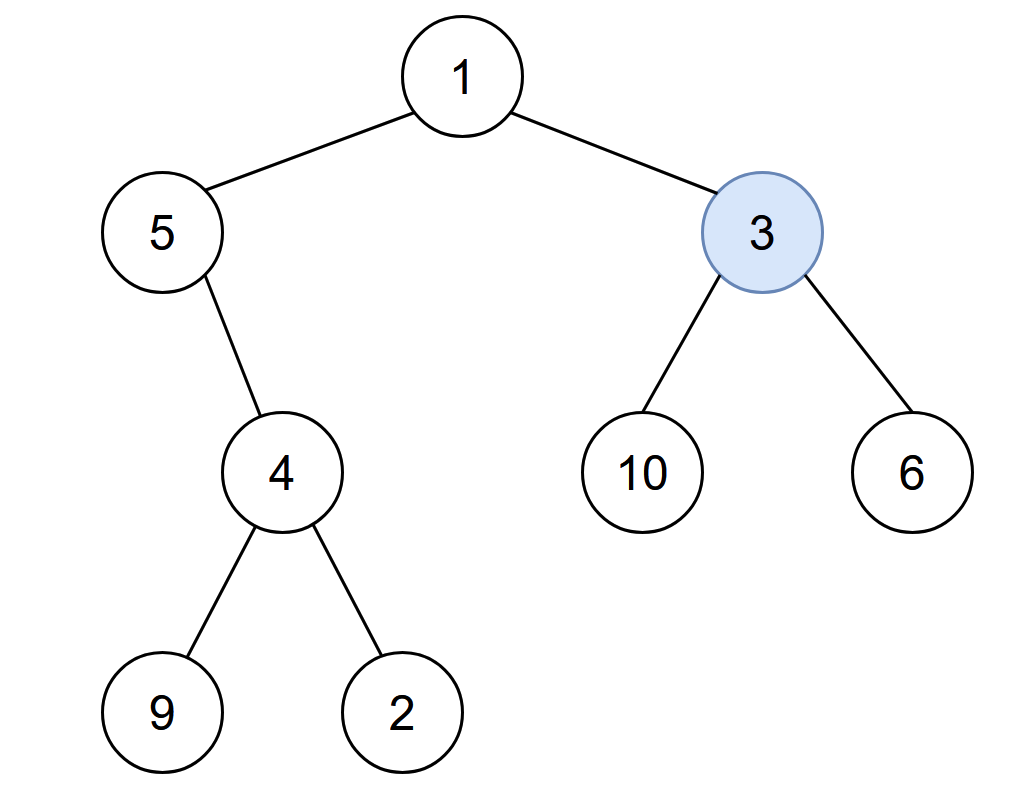Welcome to Subscribe On Youtube
Formatted question description: https://leetcode.ca/all/2385.html
2385. Amount of Time for Binary Tree to Be Infected
- Difficulty: Medium.
- Related Topics: Tree, Depth-First Search, Breadth-First Search, Binary Tree.
- Similar Questions: Maximum Depth of Binary Tree, Shortest Path to Get Food, All Nodes Distance K in Binary Tree.
Problem
You are given the root of a binary tree with unique values, and an integer start. At minute 0, an infection starts from the node with value start.
Each minute, a node becomes infected if:
-
The node is currently uninfected.
-
The node is adjacent to an infected node.
Return the number of minutes needed for the entire tree to be infected.
Example 1:

Input: root = [1,5,3,null,4,10,6,9,2], start = 3
Output: 4
Explanation: The following nodes are infected during:
- Minute 0: Node 3
- Minute 1: Nodes 1, 10 and 6
- Minute 2: Node 5
- Minute 3: Node 4
- Minute 4: Nodes 9 and 2
It takes 4 minutes for the whole tree to be infected so we return 4.
Example 2:

Input: root = [1], start = 1
Output: 0
Explanation: At minute 0, the only node in the tree is infected so we return 0.
Constraints:
-
The number of nodes in the tree is in the range
[1, 105]. -
1 <= Node.val <= 105 -
Each node has a unique value.
-
A node with a value of
startexists in the tree.
Solution (Java, C++, Python)
-
/** * Definition for a binary tree node. * public class TreeNode { * int val; * TreeNode left; * TreeNode right; * TreeNode() {} * TreeNode(int val) { this.val = val; } * TreeNode(int val, TreeNode left, TreeNode right) { * this.val = val; * this.left = left; * this.right = right; * } * } */ class Solution { private int max = 0; public int amountOfTime(TreeNode root, int start) { dfs(root, start, new Distance(-1)); return max; } private int dfs(TreeNode root, int start, Distance l) { if (root == null) { return 0; } Distance ld = new Distance(-1); Distance rd = new Distance(-1); int left = dfs(root.left, start, ld); int right = dfs(root.right, start, rd); if (l.val == -1 && start == root.val) { max = Math.max(left, right); l.val = 1; } if (ld.val != -1) { max = Math.max(max, ld.val + right); l.val = ld.val + 1; } else if (rd.val != -1) { max = Math.max(max, rd.val + left); l.val = rd.val + 1; } return Math.max(left, right) + 1; } private static class Distance { int val; Distance(int v) { this.val = v; } } } ############ /** * Definition for a binary tree node. * public class TreeNode { * int val; * TreeNode left; * TreeNode right; * TreeNode() {} * TreeNode(int val) { this.val = val; } * TreeNode(int val, TreeNode left, TreeNode right) { * this.val = val; * this.left = left; * this.right = right; * } * } */ class Solution { private Map<Integer, List<Integer>> g = new HashMap<>(); public int amountOfTime(TreeNode root, int start) { dfs(root); Deque<Integer> q = new ArrayDeque<>(); Set<Integer> vis = new HashSet<>(); q.offer(start); int ans = -1; while (!q.isEmpty()) { ++ans; for (int n = q.size(); n > 0; --n) { int i = q.pollFirst(); vis.add(i); if (g.containsKey(i)) { for (int j : g.get(i)) { if (!vis.contains(j)) { q.offer(j); } } } } } return ans; } private void dfs(TreeNode root) { if (root == null) { return; } if (root.left != null) { g.computeIfAbsent(root.val, k -> new ArrayList<>()).add(root.left.val); g.computeIfAbsent(root.left.val, k -> new ArrayList<>()).add(root.val); } if (root.right != null) { g.computeIfAbsent(root.val, k -> new ArrayList<>()).add(root.right.val); g.computeIfAbsent(root.right.val, k -> new ArrayList<>()).add(root.val); } dfs(root.left); dfs(root.right); } } -
# Definition for a binary tree node. # class TreeNode: # def __init__(self, val=0, left=None, right=None): # self.val = val # self.left = left # self.right = right class Solution: def amountOfTime(self, root: Optional[TreeNode], start: int) -> int: def dfs(root): if root is None: return if root.left: g[root.val].append(root.left.val) g[root.left.val].append(root.val) if root.right: g[root.val].append(root.right.val) g[root.right.val].append(root.val) dfs(root.left) dfs(root.right) g = defaultdict(list) dfs(root) vis = set() q = deque([start]) ans = -1 while q: ans += 1 for _ in range(len(q)): i = q.popleft() vis.add(i) for j in g[i]: if j not in vis: q.append(j) return ans ############ # 2385. Amount of Time for Binary Tree to Be Infected # https://leetcode.com/problems/amount-of-time-for-binary-tree-to-be-infected/ # Definition for a binary tree node. # class TreeNode: # def __init__(self, val=0, left=None, right=None): # self.val = val # self.left = left # self.right = right class Solution: def amountOfTime(self, root: Optional[TreeNode], start: int) -> int: time = 0 graph = defaultdict(list) N = 0 def dfs(node): nonlocal N if not node: return N += 1 if node.left: graph[node.left.val].append(node.val) graph[node.val].append(node.left.val) if node.right: graph[node.right.val].append(node.val) graph[node.val].append(node.right.val) dfs(node.left) dfs(node.right) dfs(root) if N == 1: return 0 s = [start] visited = defaultdict(lambda : False) visited[start] = True while s: nxt = [] for node in s: for nei in graph[node]: if not visited[nei]: visited[nei] = True nxt.append(nei) time += 1 s = nxt return time - 1 -
/** * Definition for a binary tree node. * struct TreeNode { * int val; * TreeNode *left; * TreeNode *right; * TreeNode() : val(0), left(nullptr), right(nullptr) {} * TreeNode(int x) : val(x), left(nullptr), right(nullptr) {} * TreeNode(int x, TreeNode *left, TreeNode *right) : val(x), left(left), right(right) {} * }; */ class Solution { public: unordered_map<int, vector<int>> g; int amountOfTime(TreeNode* root, int start) { dfs(root); queue<int> q{ {start} }; unordered_set<int> vis; int ans = -1; while (q.size()) { ++ans; for (int n = q.size(); n; --n) { int i = q.front(); q.pop(); vis.insert(i); for (int j : g[i]) { if (!vis.count(j)) { q.push(j); } } } } return ans; } void dfs(TreeNode* root) { if (!root) return; if (root->left) { g[root->val].push_back(root->left->val); g[root->left->val].push_back(root->val); } if (root->right) { g[root->val].push_back(root->right->val); g[root->right->val].push_back(root->val); } dfs(root->left); dfs(root->right); } }; -
/** * Definition for a binary tree node. * type TreeNode struct { * Val int * Left *TreeNode * Right *TreeNode * } */ func amountOfTime(root *TreeNode, start int) int { g := map[int][]int{} var dfs func(*TreeNode) dfs = func(root *TreeNode) { if root == nil { return } if root.Left != nil { g[root.Val] = append(g[root.Val], root.Left.Val) g[root.Left.Val] = append(g[root.Left.Val], root.Val) } if root.Right != nil { g[root.Val] = append(g[root.Val], root.Right.Val) g[root.Right.Val] = append(g[root.Right.Val], root.Val) } dfs(root.Left) dfs(root.Right) } dfs(root) q := []int{start} ans := -1 vis := map[int]bool{} for len(q) > 0 { ans++ for n := len(q); n > 0; n-- { i := q[0] q = q[1:] vis[i] = true for _, j := range g[i] { if !vis[j] { q = append(q, j) } } } } return ans } -
/** * Definition for a binary tree node. * class TreeNode { * val: number * left: TreeNode | null * right: TreeNode | null * constructor(val?: number, left?: TreeNode | null, right?: TreeNode | null) { * this.val = (val===undefined ? 0 : val) * this.left = (left===undefined ? null : left) * this.right = (right===undefined ? null : right) * } * } */ function amountOfTime(root: TreeNode | null, start: number): number { const map = new Map<number, number[]>(); const create = ({ val, left, right }: TreeNode) => { if (left != null) { map.set(val, [...(map.get(val) ?? []), left.val]); map.set(left.val, [...(map.get(left.val) ?? []), val]); create(left); } if (right != null) { map.set(val, [...(map.get(val) ?? []), right.val]); map.set(right.val, [...(map.get(right.val) ?? []), val]); create(right); } }; create(root); const dfs = (st: number, fa: number) => { let res = 0; for (const v of map.get(st) ?? []) { if (v !== fa) { res = Math.max(res, dfs(v, st) + 1); } } return res; }; return dfs(start, -1); }
Explain:
nope.
Complexity:
- Time complexity : O(n).
- Space complexity : O(n).